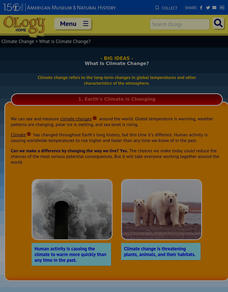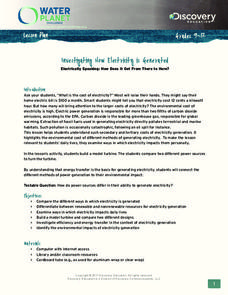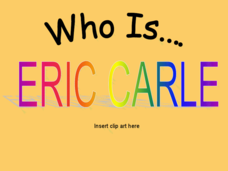American Museum of Natural History
What Is Climate Change?
So many factors show that climate change has arrived. Learners read through an online resource that explains the data and the consequences of climate change. They also review strategies for slowing or even reversing the global influence.
K12 Reader
What is an Appositive?
Appositives, those tricky little words and phrases that provide more information about nouns, are the subject of a series of worksheets linked to this resource.
Talking with Trees
What is Respect?
Inspire scholars to be the best they can be with a worksheet featuring the character trait, respect. Individuals read multiple scenarios, match their outcomes, and identify whether the behavior was respectful or...
Space Awareness
What is a Constellation
Why do some stars in a constellation appear brighter than others? Using a get-up-and-move astronomy activity, scholars explore perspective and the appearance of constellations in the sky while developing an understanding of the...
Missouri Department of Elementary
What Are Bullying And Harassment? Part 1
A brief survey begins a lesson that challenges scholars to answer the question, What is bullying? Learners discuss their answers and take notes, paying close attention to the types of bullying and roles people play. Pupils change their...
Columbus City Schools
What’s Up with Matter?
Take a "conservative" approach to planning your next unit on mass and matter! What better way to answer "But where did the gas go?" than with a lab designed to promote good report writing, research skills, and detailed observation....
K12 Reader
What Is an Adverb?
How, when, where, why. After a brief explanation of the types of additional information adverbs supply about verbs, kids circle the adverbs in a group of sentences and label the type of information provided.
Curated OER
What a Gift!
What is considered a valuable gift? As the class will come to find out, what is considered a gift varies by time and location. After viewing images of a Mayan pot that depicts men giving cacao to the gods, learners research three...
Missouri Department of Elementary
What Is Comfortable and Uncomfortable Touch?
Two stuffed animals open a lesson that examines two types of touch. Scholars discuss the difference between comfortable and uncomfortable touch. They offer examples then brainstorm ways an individual can keep safe from uncomfortable...
EarthEcho International
Investigating How Electricity is Generated
What is the real cost of electricity? The real cost is not just the price you pay, but the environmental and economic costs as well. Scholars build, use, and judge the effectiveness of a turbine. They also investigate the...
Wind Wise Education
Where is it Windy?
How is the wind up there? The class builds a topography model using materials available in the classroom, then place wind flags in different locations on the landscape. Using a fan as a wind source, pupils collect data about how wind...
Peel-Public Health
What Is Respiratory Infection?
Empower your pupils to be germ stoppers! The heart of these lessons lies in stopping the spread of germs and keeping clean hands in order to prevent cases like a respiratory infection. It includes a game to simulate how germs can...
Teach Engineering
What's Wrong with the Coordinates at the North Pole?
Here is an activity that merges technology with life skills as individuals use Google Earth to explore the differences between coordinate systems and map projections. The self-guided worksheet is the fourth segment in a nine-part unit....
Curated OER
What is Plastic?
Students experiment with plastics. In this what is plastic instructional activity, students make a simple polymer and discuss recycling. Students identify various types of plastics.
Curated OER
What is a National Forest
Students select and research a National Forest near their local community. They read and discuss the pamphlet "A Guide To Your National Forests," view photos of national forests, conduct Internet research, and complete the student...
Curated OER
Thinking About Technology: What Is It? How Can It Help Us?
What is technology and how can it help us? Using a worksheet, students read a list and choose practical applications of scientific knowledge, brainstorm examples of home, school and hospital technology, graph answers in a pie chart, and...
Alabama Learning Exchange
Who Is Eric Carle?
Providing a template for a discussion of Eric Carle and his works, this presentation has empty spaces left specifically for adding pictures and information about this author. This exploration of Carle is only rudimentary, but a novel...
Curated OER
What is your Air Quality?
In this air quality worksheet, students use the EPA's Six Common Air Pollutants web site and the AIRNow web site to answer 9 questions about common air pollutants, how pollution affects people and the environment, how pollutants are...
Curated OER
What is Art?
Students become familiar with the art and architecture and history of the Chicago World's Fair. In this public arts project activity, students compare and contrast fine art and public art through a study of the exhibits at the...
Baylor College
Pre-Assessment Activity: What Do You Know About Microbes?
In an introductory activity, youngsters take a pre-assessment quiz, get a grasp of a gram of mass, and then estimate the mass of microorganisms that live within a human body. Using Glo Germ™, a material that allows you to simulate the...
Curated OER
What Is in the Water?
Young scholars compare bottled water qualities to water found naturally in a pond habitat. They research their state's laws/regulations in regard to bottled water and study the advertising, cost, and quality of brands of bottled water....
Thirteen Ed Online
What is Conceptual Art?
Research, art history, and web page creation! Sounds too good to be true. With tons of links and resources, the lesson plan provides you with everything needed to engage the class in an amazing art and research activity. They create...
Illustrative Mathematics
What is a Trapezoid? (Part 1)
Challenge your class to construct a definition for trapezoids. Looking at four examples and four non-examples, students individually create definitions and use them to classify an unknown shape. Allow for small group and whole-class...
NOAA
What Little Herc Saw
See the underwater world through a different pair of eyes! Middle school marine biologists identify deep-sea organisms by examining images taken by an ROV from the Okeanos Explorer. After determining what creatures lie beneath the...
Other popular searches
- What Is Inauguration
- What Is an Autobiography
- What Is Veterans Day
- What Is Democracy
- What Is Science
- What Is Gravity
- What Is Algebraic Expression
- What Is a Memoir
- What Is Culture
- What Is Anthropology
- What Is Contemporary Music
- What Is Home Economics























